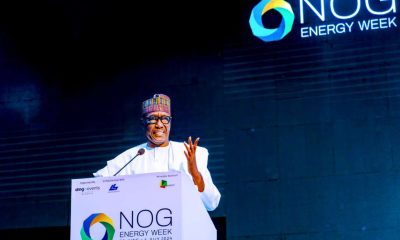Business
Audit exposes N61bn financial violations in NNPCL as 28 irregularities shake oil giant

A new audit has uncovered over N61bn in questionable payments, undocumented expenditures, and sweeping financial violations at the Nigerian National Petroleum Company Limited, raising fresh concerns over accountability at the country’s most powerful state-owned enterprise.
The explosive findings are contained in the 2022 Annual Report on Non-Compliance (Volume II) issued by the Office of the Auditor-General for the Federation. The report covers transactions carried out in 2021 during the tenure of Mele Kyari, across the NNPCL and its subsidiaries and has already been submitted to the National Assembly.
The audit flagged 28 major infractions involving N30.1bn; $51.6m; £14.3m; and €5.17m, amounting to roughly N61.1bn when converted to naira.
According to the Auditor-General, the irregularities range from unsupported payments and missing documents to unauthorised virements, procurement breaches, abandoned projects, tax violations, and unaccounted foreign transactions.
“These findings highlight systemic weaknesses that continue to expose public funds to avoidable risk,” the Auditor-General’s office warned. “Where documents were not provided, payments were unjustified. Where approvals were absent, expenditure breached the law.”
The revelations deepen long-standing concerns following earlier audits that accused NNPC of diverting N2.68tn and $19.77m between 2017 and 2021.
£14.3m Spent in London Office With Zero Documentation
One of the most alarming revelations involves the NNPCL London Office, where £14,322,426.59 was spent with no supporting documents.
According to the report, the London Office disbursed the funds on personnel costs, fixed contract expenses and operational needs, but failed to produce vouchers, invoices, schedules or internal approvals—violating multiple provisions of the Financial Regulations.
Auditors said the lack of documentation made it impossible to verify the legitimacy or purpose of the spending, describing it as a glaring sign of weak internal controls.
NNPCL management claimed the office operated within its approved budget and maintains detailed records, but the Auditor-General rejected the explanation as “unsatisfactory,” insisting the corporation must provide full accountability.
The report recommended that the Group CEO of NNPCL be summoned by the Public Accounts Committees to explain the spending. It also directed the recovery of the entire £14.32m and sanctions for officers responsible.
€5.17m Paid to Contractor Without Evidence of Engagement
Another major query concerns a payment of €5,165,426.26 made to a contractor with no evidence of contract award or service delivery.
Auditors said not a single document was provided to justify the multi-million-euro transaction.
Over $51m in Irregular Dollar Payments
Dollar-denominated transactions also raised serious red flags, including:
$22.84m in unsubstantiated Direct Sales Direct Payment settlements
$12.44m for delayed generator procurement at Mosimi depot
$1.80m paid under an irregular bunkering-vessel contract extension
$2.00m in provisional payments without invoices
$1.03m paid to a company lacking legal authority to transact
Across all queries, auditors flagged a total of $51.67m as improper or unverifiable.
N30.1bn in Domestic Breaches
On the naira side, auditors identified N30.1bn in violations, including:
N12.72bn not remitted to the General Reserve Fund
N3.45bn approved by an official without GMD authorisation
N2.38bn irregularly paid as vehicle-status cash options to staff
N1.21bn paid to contractors without invoices or certificates
N474.5m spent through unauthorised virement
N355.4m in demurrage on refinery cargoes that were never cleared
N292.6m wasted on an abandoned emergency hospital project
Auditors also flagged widespread failures to deduct or remit statutory taxes, amounting to N247.18m and $529,863.
Contract Substitution Scam Costing $1.93m
One of the more intricate breaches concerns a time-charter contract signed in 2017 for the vessel MT Breeze Stavanger. The contractor later substituted the vessel with MT Alizea, billing NNPC at a higher daily rate in violation of contract terms.
The irregular substitution lasted 30 months, costing NNPC an additional $1.93m.
Auditors described the action as “an unjustifiable adjustment of contract conditions.”






